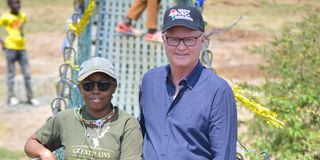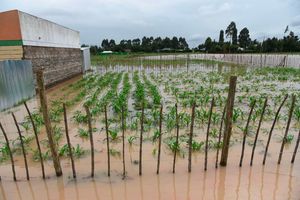Developing story: Iranian President Ebrahim Raisi confirmed dead in chopper crash
Great Plains Foundation pledges support for Maasai Mara communities

Marrietta Keru, Programme Manager, Great Plains Foundation and Harmon Parkar, Founder Bridging the Gap Africa stand at the bridge the two organizations constructed, during the launch event on June 30, 2023.
What you need to know:
- Foundation has been running school-feeding programmes in several schools across the region.
- Many children in arid and semi-arid regions are forced to drop out of school during drought seasons.
Great Plains Foundation, a Non-Governmental Organisation (NGO) associated with Great Plains Conservation, has pledged to continue with its activities supporting communities in the Maasai Mara region, with activities around school-feeding programmes, construction of bridges and other projects in health and education.
The foundation said this as it launched a bridge it constructed in partnership with Bridge the Gap Africa, bringing to four, the number of bridges the two organisations have put up in the Maasai Mara region.
“We plan to continue partnerships with the community by Impact through education. This is in terms of school feeding program in Kajiado county (Shompole and Mbirikani region) where Great Plains also operates,” Marrieta Keru, Program Manager at Great Plains Foundation, said.
School-feeding programmes
The foundation has also said it aims to give children in the region an equal opportunity to learning, by making sure that they are healthy to attend school.
It has been running school-feeding programmes in several schools across the region, where at least 12,400 school children have benefitted. Many children in arid and semi-arid regions are forced to drop out of school during drought seasons, when families are faced with hunger.
“The bridges in the Masai Mara have benefitted 3000 community members, including school going children who use the bridges whenever it rains,” Ms Keru said.
Access to medical facilities
The foundation has pointed out that rains in the Masai Mara cause fast-flowing rivers, often cutting off communities from schools, clinics and markets, creating a need for infrastructure that withstands the test of bad weather.
“In the rainy season, children would miss school because the water levels were too dangerous to cross, setting them back in their education,” the foundation said.
The organizations said the bridges have enabled children to continue with their education safely and progress in school, families have safe access to medical facilities and clinics and transportation of goods by businesses.




